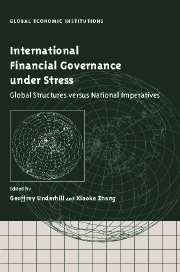Book contents
- Frontmatter
- Contents
- List of figures
- List of tables
- List of contributors
- Acknowledgements
- Introduction: global market integration, financial crises and policy imperatives
- I Financial globalisation and policy responses: concepts and arguments
- II Globalisation, financial crises and national experiences
- 5 Crisis consequences: lessons from Thailand
- 6 The politics of financial reform: recapitalising Indonesia's banks
- 7 South Korea and the Asian crisis: the impact of the democratic deficit and OECD accession
- 8 Currency crises in Russia and other transition economies
- 9 Capital account convertibility and the national interest: has India got it right?
- 10 Learning to live without the Plan: financial reform in China
- 11 The Asian financial crisis and Japanese policy reactions
- III Private interests, private–public interactions and financial policy
- IV Building the new financial architecture: norms, institutions and governance
- Conclusion: towards the good governance of the international financial system
- Index
7 - South Korea and the Asian crisis: the impact of the democratic deficit and OECD accession
Published online by Cambridge University Press: 22 September 2009
- Frontmatter
- Contents
- List of figures
- List of tables
- List of contributors
- Acknowledgements
- Introduction: global market integration, financial crises and policy imperatives
- I Financial globalisation and policy responses: concepts and arguments
- II Globalisation, financial crises and national experiences
- 5 Crisis consequences: lessons from Thailand
- 6 The politics of financial reform: recapitalising Indonesia's banks
- 7 South Korea and the Asian crisis: the impact of the democratic deficit and OECD accession
- 8 Currency crises in Russia and other transition economies
- 9 Capital account convertibility and the national interest: has India got it right?
- 10 Learning to live without the Plan: financial reform in China
- 11 The Asian financial crisis and Japanese policy reactions
- III Private interests, private–public interactions and financial policy
- IV Building the new financial architecture: norms, institutions and governance
- Conclusion: towards the good governance of the international financial system
- Index
Summary
The purpose of this chapter is to explore the consequences for South Korea of both its democratic deficit and its accession to membership of the Organisation for Economic Co-operation and Development (OECD) in late 1996. It is argued that the interaction of weak governance and imprudent liberalisation was a material contributor to the financial crisis that occurred in late 1997.
This chapter attempts to put governance at the centre of the policy quandary faced by this important Asian country. Thus this analysis of the events leading up to the 1997 financial calamity will go beyond the calculus of economists. That calculus portrays such concepts as ‘crony capitalism’, imbalances in the trade account, exchange rate disequilibria, moral hazard, the herd instinct in the market and systemic contagion as the major causes of the country's financial problems. It is argued in this chapter that these factors were manifestations of the shortcomings in the country's governance structures.
The chapter will show that ‘authoritarian capitalism’ in South Korea – its hybridity – was not compatible with the state's desire for the economy to engage as a fully competitive participant in international finance and commerce. Korean society generally, and the business and political elites in particular, did not share the important values of democratic capitalism.
- Type
- Chapter
- Information
- International Financial Governance under StressGlobal Structures versus National Imperatives, pp. 140 - 159Publisher: Cambridge University PressPrint publication year: 2003
- 3
- Cited by

